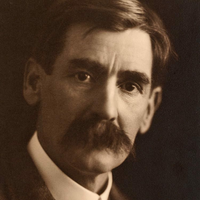Captain Von Esson of the “Sebastopol”
"Let me fire one shot for Russia, though that shot should be the last." That line happened in a rhyme I wrote for the Bulletin before the fall of Port Arthur. Strange to say, I was unaware of the incident of the Sebastopol cruiser till I came across it the other day on a recent book on the siege. — H. L.
Of his beauty, or stature, or colour of hair I hadn’t the slightest hint,
But he comes to me as a little man, with a scrubby beard and a squint,
With a heart somewhere if it wasn’t there, and an Irish terrier nose,
With a bark or a yelp for his friends and his crew, and a bull-dog grip for his foes.
The Japs had taken a permanent fort at the price of ten thousand sons,
And they shelled the ships in the harbour there with their landed naval guns.
Through sand bags laid on the upper deck, the shells went through with a whelt—
And some (because of ballistic curve) out under the armoured belt.
Till each was sunk that the Russians left—while the buildings reeled with the shock,
Save the last of the Russian ships of war—the Sebastopol—in dock.
And this is the reason—told in a line—why there is a tale to tell:
The Sebastopol had a man for boss, and a crew that knew it well.
He rousted them out from the dens ashore, and they didn’t engage in prayer,
For dear men pray when the fight is done, and there wasn’t a cheap man there.
He rooted the dock-hands out, when crouched, in deadly fear of the Jap,
But they stood in greater immediate fear of Von Esson’s squint and his yap.
She groped her way in the gathering dusk, out under the time-dulled din,
And nothing was heard save a whispered word, and the laugh of a Russian Finn.
He took her out from the harbour trap, where the shells came down like hail,
For a chance to fight for the Wrong or Right round under the “Lizard’s Tail.”
My fathers came from the North, my friends, when there was a world to win;
And something hints of the Northern Wolf in the laugh of a Russian Finn;
A sailor he was, with gorilla arms, and a mighty, hairy chest—
‘T was a laugh of love for his captain man, and a laugh of hate for the rest.
There is neither the time nor the space to tell of the deeds that those Russians did;
Three days on the toppling lid of hell, like an ill-made cauldron’s lid.
The breathless pause ere the flashlight fell where the creeping foe was hid,
The blood-streaked decks, and the grunt or yell, when the stricken slipped and slid.
The faces white in a sudden light, and the ghostly dying grin,
The great relief when the silence broke, and they revelled in Hell’s own din.
The blinding flash and the stunning crash—strained ears—strained eyes—dry skin—
The short sharp yelp of that captain man, and—the laugh of the Russian Finn.
‘T was not for Cause nor for Liberty, Religion, or Glory, or Land—
He fought for love of a captain man he could crush with his big right hand.
Till five torpedo boats round her lay, in the mud, the slush, and the ooze—
She sent them down for the Old Greek Church, with the whole of their monkey crews.
But the last one gave her a last thrust home, and left by a friendly tide,
She lay like a man on his elbow raised, with a hand on her wounded side.
She was left to be called for later on, with a solid bank beneath—
The Japs were short of torpedo boats, and—they’d had enough of her teeth.
But, safe from the landed naval guns, and the last torpedo boat,
Von Esson worked with his squint and bark till he got his vessel afloat.
He’d marked her a grave with his level eye where the open sea was fair,
And he steered her out to the deep water, and he grimly sank her there.
(It’s oh, for a chance when a man of men must live the living lie—
For a chance to live as a man might live, and die as a man might die!
When one is a slave to paltry things in a life that never can change,
It’s oh! for a cause, and a decent gun, and a hundred rounds, and the range!)
The boats slipped in in the gathering dusk, and under the time-dulled din,
And vanished from us to a yap of command, and the grunt of a Russian Finn.
But somewhere down in a seamen’s den (maybe, perhaps within hail),
There’s a drunken rabble of sailor men, and a Finn that tells a tale.

